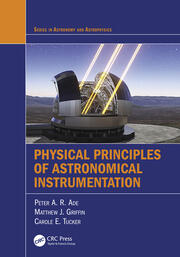Physical Principles of Astronomical Instrumentation, 1st Edition-Test Bank
Format: Downloadable ZIP File
Resource Type: Test bank
Duration: Unlimited downloads
Delivery: Instant Download
Check out Monetary establishment for Physical Principles of Astronomical Instrumentation, 1st Edition
Offering wise suggestion on a range of wavelengths, this extraordinarily accessible and self-contained e guide presents a broad overview of astronomical instrumentation, methods, and devices.
Drawing on the notes and lessons of the authors’ established graduate course, the textual content material opinions elementary concepts in astrophysics, spectroscopy, and signal analysis. It accommodates illustrative points and case analysis and targets to supply readers with a toolbox for observational capabilities all through the electromagnetic spectrum and the knowledge to know which devices are best suited to utterly totally different observations. It’s a excellent info for undergraduates and graduates studying astronomy.
Choices:
-
- Presents a self-contained account of a extraordinarily difficult subject.
-
- Affords wise suggestion and instruction on a range of wavelengths and devices.
- Consists of case analysis and points for extra finding out options.
Creator(s)
Biography
Professor Peter A. R. Ade
Professor Peter Ade obtained his PhD from Queen Mary College, London, in 1973, the place he continued to assemble up a submillimetre wave instrumentation group specialising in producing state-of-the-art gadgets for use in every atmospheric and astronomical evaluation. In 2001 he relocated to Cardiff with totally different colleagues to type an even bigger instrumentation group. He is a member of the Royal Astronomical Society and is a chartered physicist with the Institute of Physics. He has over forty years’ experience in instrumentation design and manufacture whereas pursuing his observational astrophysics and atmospheric science pursuits. He has been involved with the occasion and deployment of many astronomical gadgets along with ISO-LWS, Cassini-CIRS, Mars-PMIRR, SPT-pol, ACT-pol, EBEX, Pilot, BLAST, SCUBA, SCUBA-2, Spitzer, Herschel-SPIRE and Planck-HFI). In 1994 he was awarded a NASA public service medal for his contributions to elementary advances in far infrared detector and sensor methods, which enabled very important measurements of atmospheric ozone chemistry. In 2009 he was launched with the Royal Astronomical Society Jackson-Gwilt Medal for contributions to astronomical instrumentation.
Professor Matt Griffin
Professor Matt Griffin studied Electrical Engineering at Faculty College Dublin and Astrophysics at Queen Mary College London, receiving his PhD in 1985. His evaluation work has included the occasion of gadgets for every ground-based and space-borne observatories, and their use inside the look at of planetary atmospheres, star formation, galaxy evolution. He remained at Queen Mary until 2001, and was involved in quite a few ground-based submillimetre gadgets and in ESA’s Infrared Space Observatory. Since 2001, he has been with the Astronomy Instrumentation Group at Cardiff Faculty. Along with participating inside the SCUBA, SCUBA-2, and Planck-HFI gadgets, he was the Principal Investigator for the Herschel-SPIRE satellite tv for pc television for computer instrument, for which he was awarded the Royal Astronomical Society Jackson-Gwilt Medal in 2011. He is a Fellow if the Institute of Physics and a Fellow of the Found Society of Wales.
Professor Carole Tucker
Professor Carole Tucker studied Physics and Maths at Learning Faculty, then Medical Radiation Physics at Queen Mary and Westfield College, London, ending her PhD in 2001. Having undertaken a wonderful deal of cleanroom gadget fabrication and spectroscopy work, she took her first post-doctoral place with the Astronomy Instrumentation Group at QMW, engaged on {{hardware}} provision and characterisation for the Herschel and Planck satellite tv for pc television for computer missions. In 2001 she moved with the instrumentation group to Cardiff Faculty, the place she took her first tutorial place in 2006. Carole manages the quasi-optical filter manufacturing facility at Cardiff, which leads to involvement with a wonderful amount of worldwide FIR home and ground-based instrument teams. In addition to she works with commerce, supplying know-how to scientific disciplines exterior of astronomy. She is a Fellow of the Institute of Physics, the Royal Astronomical Society and of the Found Society of Wales.
User Reviews
Be the first to review “Physical Principles of Astronomical Instrumentation, 1st Edition-Test Bank”

Original price was: $45.00.$34.97Current price is: $34.97.






There are no reviews yet.